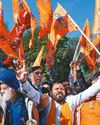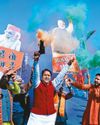
SEVEN decades ago, the eminent American political scientist, Professor Seymour Martin Lipset, published a seminal research paper, ‘Some Social Requisites of Democracy: Economic Development and Political Legitimacy’ in the authoritative American Political Science Review in 1959. His thesis was that advanced levels of literacy, industrialisation and urbanisation were required for democracy to succeed. It became an influential argument in those contentious days of the Cold War, and provided the Western policy elite a rationalisation for Washington’s support and patronage for military regimes in various continents.
Indian voters had neither heard of nor cared for Lipset. They definitely proved the Harvard professor repeatedly wrong, but most emphatically in 1977. Nonetheless, the voters reserved their most resounding refutation for the Lipset thesis till 2024 as for the first time, democracy as an ideology triumphed over fancy notions of strong-leader-led-autocracy.
The last 10 years have seen a very determined ideological assault on the idea of democracy, anchored in constitutional legitimacy. A tiny elite—a dozen favoured business houses, a band of technocratic bureaucrats, and a corrupt and corrupting media mafia—had enlisted the upper castes and upper classes in a Project Limited Democracy to install an anti-people policy regime. The 2024 vote came down to whether the masses wanted to lend their imprimatur to an all-powerful, unaccountable, and omnipresent State, which provides a shield to the power-hungry elite to carry on its greedy business.
この記事は Outlook の July 01, 2024 版に掲載されています。
7 日間の Magzter GOLD 無料トライアルを開始して、何千もの厳選されたプレミアム ストーリー、9,000 以上の雑誌や新聞にアクセスしてください。
すでに購読者です ? サインイン
この記事は Outlook の July 01, 2024 版に掲載されています。
7 日間の Magzter GOLD 無料トライアルを開始して、何千もの厳選されたプレミアム ストーリー、9,000 以上の雑誌や新聞にアクセスしてください。
すでに購読者です? サインイン

Friendship Loveship Hateship
The world is presently battling a loneliness epidemic, but it’s the well-connected’ who are the loneliest. These days, they are looking to make connections at social meet-ups

Scripting Loneliness
With the turn of the millennium, Indian audiences got to see what actually happens when fairytale romance ends and life begins on the big screen

Confined, Constricted
Love and loneliness co-exist in spaces where desires struggle to navigate through narrow lanes, love flounders to flourish in tiny homes and heart-to-heart conversations get muted in the cacophony of everyday drudgery

Rusted Ruins
Archaeology trapped in jingoist trenches

BJP's Delhiverance
The double engine sarkaar will have to show some quick results to Delhi's middle class which has trusted it to improve the city’s infrastructure

AAP Rejected, or BJP Elected?
ls the electorate voting to reject rather than voting to elect?

Crying in Love is to Grow in Love
To be in love is to check one's mortality and start with the quiver of optimism

Half Moon
Desire is not Just about the body but the entire world through the body. In fact, the world becomes the body of the absent lover

Love, Actually
British novelist and scriptwriter David Nicholls is the author of six novels, including the global bestseller One Day (2009).

Big City Blues
Queer people find vibrancy and welcome anonymity in megacities but there is a limit to the choices they offer